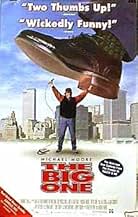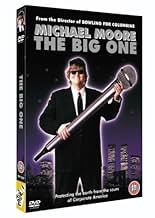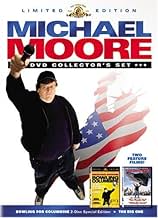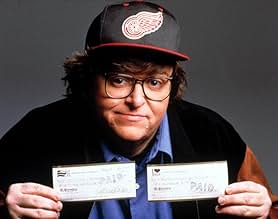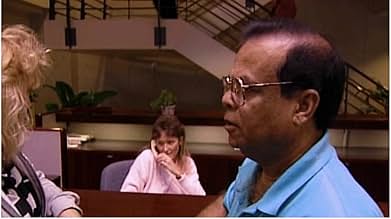The Big One
- 1997
- Tous publics
- 1h 31m
IMDb RATING
7.1/10
8.1K
YOUR RATING
On his book tour, Michael Moore exposes wrongdoing by big greedy businesses and callous politicians around America.On his book tour, Michael Moore exposes wrongdoing by big greedy businesses and callous politicians around America.On his book tour, Michael Moore exposes wrongdoing by big greedy businesses and callous politicians around America.
- Awards
- 6 wins total
Bill Clinton
- Self - Presidential Candidate
- (archive footage)
Jim Czarnecki
- Self
- (as Jim)
Brian Danitz
- Self
- (as Brian)
Robert Dornan
- Self - Congressman
- (archive footage)
Steve Forbes
- Self - Presidential Candidate
- (archive footage)
- Director
- Writer
- All cast & crew
- Production, box office & more at IMDbPro
Featured reviews
I applaud Michael Moore for addressing gnarly, difficult subjects that other commentators and especially the news media are too chicken to tackle. This 1997 BBC documentary follows his '96 book tour promoting "Downsize This!". In the film, Moore travels to small town and Rust Belt America -- places often ignored by other social critics in favor of big cities and glamor locations. The realism and problems of ordinary, middle class, Middle Americans is one of the highlights of the film. This is an honest look at the economic problems in the US circa the 90s.
One of Moore's strengths and weaknesses is just how funny he is -- he's a skilled speaker and essentially a talented stand-up comic, whose material is politically skewed and occasionally self-deprecating. This is disarming, and also plain, laugh-out-loud funny. I watched this film recently with a group of people who were in stitches, even though some of the material (in 2005) is a bit outdated by recent historical events. Some of Moore's funniest material is when he confronts executives or stone faced PR honchos, and waits for their predictable, canned, nonsensical remarks designed to give little information and obscure the issue at hand. It's powerful stuff, watching the rich and selfish defending their privileges, and a scathing commentary on economic inequality in what we like to think is the freest, richest, most egalitarian society in the world.
HOWEVER -- Moore often weakens his own arguments by using shoddy and overly simplistic examples. Comparing a torn-down factory in Flint Michigan to the Oklahoma City bombing is very tacky, and not even a good analogy -- the loss in Oklahoma was human life, including many pre-school children...the loss of the Murrah building itself is insignificant. Unemployed workers in Flint do actually have other options, like moving elsewhere for work. It's a cheap shot. Another lame effort occurs when Moore challenges the president of Nike to build a shoe factory in Flint, over his objections that "American's don't want to make shoes". Moore claims he will get 100 workers together who do want to produce footwear for Nike -- then the film shows a pitiful rally of a couple dozen folks, many of whom are small children. Closeup photography obscures the fact that Moore could NOT find 100 willing workers in Flint, despite all the well-publicized poverty...is it true that Americans are unwilling to manufacture shoes? We'll never know.
Another flaw is that Michael Moore is not especially honest about his own status in all this. He's a very successful pundit and filmmaker (although this movie was made years before the phenom of "Fahrenheit 911"), and had already published several books and had a TV series. He's wealthy by the standards of most Americans, a celebrity and immune to the economic realities that he is describing. That tends to make his criticism rather facile. For example, he fails to explain how (as in the example above) Americans earning even minimum wage, about $5 per hour, can possibly compete in manufacturing with Third World workers who make 50 cents an hour...no matter how hardworking or willing those Americans are. This is the hard reality facing both employees and employers, and it's curiously left on the table here without discussion...except perhaps to suggest (vaguely) that companies should make business decisions on charitable grounds, rather than economic ones.
Still with all it's flaws, I find this (and other) Moore documentaries a valuable contribution to National debate, especially along Red State/ Blue State lines. The most valuable historical information in "The Big One" is whenvoters (talking about the '96 Clinton/Dole presidential race) say that "both candidates are the same" and "turnout will be historically low" and "who cares who is in office". Those comments are truly astonishing in light of current events and political atmosphere, and this is only 8 years later. The world has been turned on it's axis by current events! Yet it's important to realize how recent that change has occurred, and extremely valuable to look at evaluate the political and economic changes of just the last decade.
In conclusion: a challenging and interesting documentary, with some flaws, but extremely funny. Worth watching.
One of Moore's strengths and weaknesses is just how funny he is -- he's a skilled speaker and essentially a talented stand-up comic, whose material is politically skewed and occasionally self-deprecating. This is disarming, and also plain, laugh-out-loud funny. I watched this film recently with a group of people who were in stitches, even though some of the material (in 2005) is a bit outdated by recent historical events. Some of Moore's funniest material is when he confronts executives or stone faced PR honchos, and waits for their predictable, canned, nonsensical remarks designed to give little information and obscure the issue at hand. It's powerful stuff, watching the rich and selfish defending their privileges, and a scathing commentary on economic inequality in what we like to think is the freest, richest, most egalitarian society in the world.
HOWEVER -- Moore often weakens his own arguments by using shoddy and overly simplistic examples. Comparing a torn-down factory in Flint Michigan to the Oklahoma City bombing is very tacky, and not even a good analogy -- the loss in Oklahoma was human life, including many pre-school children...the loss of the Murrah building itself is insignificant. Unemployed workers in Flint do actually have other options, like moving elsewhere for work. It's a cheap shot. Another lame effort occurs when Moore challenges the president of Nike to build a shoe factory in Flint, over his objections that "American's don't want to make shoes". Moore claims he will get 100 workers together who do want to produce footwear for Nike -- then the film shows a pitiful rally of a couple dozen folks, many of whom are small children. Closeup photography obscures the fact that Moore could NOT find 100 willing workers in Flint, despite all the well-publicized poverty...is it true that Americans are unwilling to manufacture shoes? We'll never know.
Another flaw is that Michael Moore is not especially honest about his own status in all this. He's a very successful pundit and filmmaker (although this movie was made years before the phenom of "Fahrenheit 911"), and had already published several books and had a TV series. He's wealthy by the standards of most Americans, a celebrity and immune to the economic realities that he is describing. That tends to make his criticism rather facile. For example, he fails to explain how (as in the example above) Americans earning even minimum wage, about $5 per hour, can possibly compete in manufacturing with Third World workers who make 50 cents an hour...no matter how hardworking or willing those Americans are. This is the hard reality facing both employees and employers, and it's curiously left on the table here without discussion...except perhaps to suggest (vaguely) that companies should make business decisions on charitable grounds, rather than economic ones.
Still with all it's flaws, I find this (and other) Moore documentaries a valuable contribution to National debate, especially along Red State/ Blue State lines. The most valuable historical information in "The Big One" is whenvoters (talking about the '96 Clinton/Dole presidential race) say that "both candidates are the same" and "turnout will be historically low" and "who cares who is in office". Those comments are truly astonishing in light of current events and political atmosphere, and this is only 8 years later. The world has been turned on it's axis by current events! Yet it's important to realize how recent that change has occurred, and extremely valuable to look at evaluate the political and economic changes of just the last decade.
In conclusion: a challenging and interesting documentary, with some flaws, but extremely funny. Worth watching.
The Big One is a well rounded accomplishment for Michael Moore. This film is almost like watching an autobiographical documentary. The movie highlights the notable events surrounding Michael Moore's book tour for Downsize This!. The feel of a rushed and improvised tour schedule sets the pace for scenes of public speeches, crew activity, and corporate inquisition. The film shows that Michael Moore reveals his humanitarian instincts in even the most hectic of environments. The direction of developing plot is specific to each of the cities that Moore goes to on his tour. The story that surrounds Nike, Inc. is absolutely worth watching. Corporate business is analyzed throughout this film and Michael Moore makes it a point to have the audience think about what they are watching. Highly recommended for fans of Bowling for Columbine, Fahrenheit 9/11, Sicko and admirers of Michael Moore.
Very good documentary on the uncaring greed of corporate Amerika. I was, as usual, vastly amused by the corporate "whores" who went scampering for the shadows when Moore turned his light on them. Many wouldn't even let him stay in the lobby. These little weasel butt kissers will someday, if there is any justice, feel the unemployment boot crunching down on their own pathetic, fearful little craniums. Amazing how some folks can downsize their brains into feeling "my company" is always right: they need to stop genuflecting at the alter of this false god and wake up to a world of charity for their fellow man. I've been watching Moore for a while, and I don't always agree with him, but I feel he is dead on in his indictment of American conglomerates and their villainous leaders. The reply of Nike's CEO to Moore's question about his employees in the far east was telling indeed: "I don't care." Chilling.
The Big One (1997) presents itself as a spontaneous documentary of Michael Moore's outrageous adventures during the tour of his book, "Downsize This!" Moore does a good job of focusing on what's wrong in America- people work 60+ hours a week just to get by, profitable, productive factories closing to move to Mexico where workers are paid 60 cents an hour.
Unfortunately, for all of Moore's focused anger at corporate America, Moore doesn't offer much of a solution. When someone asks him why he didn't limit his book tour to union or non-corporate stores, he makes a joke about the success of his book changing his politics. Moore asks a corporate spokesperson if she thinks it's a good idea for the US to pass punitive laws against profitable corporations who export their labor to other countries. This is admirable, but I wish he had followed up on his own question.
In this film, Moore comes across as someone who has spent a lot of time focused on America's problems, but spends only a token effort in dwelling on potential solutions. This imbalance handicaps what could have been a sublimely entertaining, informative documentary. I expected information at the end of the movie about corporate ethics organizations like Corporate Watch (http://www.corpwatch.org) or information on how to start a labor union (http://www.aflcio.org). Alas, no such luck.
Despite its faults, The Big One (1997) is a must-see for anyone who believes 1) unions are corrupt; 2) corporations are corrupt; or 3) earns a salary of less than six figures a year.
Unfortunately, for all of Moore's focused anger at corporate America, Moore doesn't offer much of a solution. When someone asks him why he didn't limit his book tour to union or non-corporate stores, he makes a joke about the success of his book changing his politics. Moore asks a corporate spokesperson if she thinks it's a good idea for the US to pass punitive laws against profitable corporations who export their labor to other countries. This is admirable, but I wish he had followed up on his own question.
In this film, Moore comes across as someone who has spent a lot of time focused on America's problems, but spends only a token effort in dwelling on potential solutions. This imbalance handicaps what could have been a sublimely entertaining, informative documentary. I expected information at the end of the movie about corporate ethics organizations like Corporate Watch (http://www.corpwatch.org) or information on how to start a labor union (http://www.aflcio.org). Alas, no such luck.
Despite its faults, The Big One (1997) is a must-see for anyone who believes 1) unions are corrupt; 2) corporations are corrupt; or 3) earns a salary of less than six figures a year.
The earliest of Moore's films I've seen so far, this is definitely not his best work... technically, this is the least impressive of the ones I've seen(the others are Bowling For Columbine and Fahrenheit 9/11). The editing, pacing and presentation just isn't as sharp or clean as the other two. The score isn't as ironic or fitting either. The humor, tone and 'direction' is just as good, though. This time, Moore takes a clean shot at corporate America, and clearly exposes the indifference of the common man's fate displayed by all executives. Several times in the documentary we're introduced to companies that, despite of high profits and no problems with their workers are laying people off, closing and moving factories... putting people out of work, effectively robbing them of their livelihood. As usual, it's done in Moore's fashion of outlining the facts that support his cause and denying or ignoring the ones that do not. Of course, he gets so many laughs throughout that you barely notice it... and what he says is true, at least to a certain extent. The interviews in which Moore asks all the right questions, usually very controversial and direct are inter-cut with what appears to be a stand-up performance by him, which adds a sense of closeness that means a lot for the effect of the film. Not as memorable and interesting as Bowling or Fahrenheit, but most definitely worth watching. I recommend this to any fan of Michael Moore and humorous documentaries. 8/10
Did you know
- TriviaMichael Moore: [Flint] Moore tries to convince Phil Knight to open a factory in Flint, Michigan.
- Quotes
Michael Moore: [referring to McDonald's] They put vegetables on my fish filet. Fuckers.
- Crazy creditsTo make a reservation on TWA call 1-800-221-2000
- SoundtracksPanic In Detroit
(1973)
Written and Performed by David Bowie
Courtesy of Jones/Tintoretto Entertainment Co., LLC
By kind permission of Tintoretto Music/RZO Music
EMI Publishing Ltd., Chrysalis Music
- How long is The Big One?Powered by Alexa
Details
- Release date
- Countries of origin
- Official site
- Language
- Also known as
- The big one
- Filming locations
- Production companies
- See more company credits at IMDbPro
Box office
- Gross US & Canada
- $720,074
- Opening weekend US & Canada
- $146,909
- Apr 12, 1998
- Gross worldwide
- $720,074
Contribute to this page
Suggest an edit or add missing content

